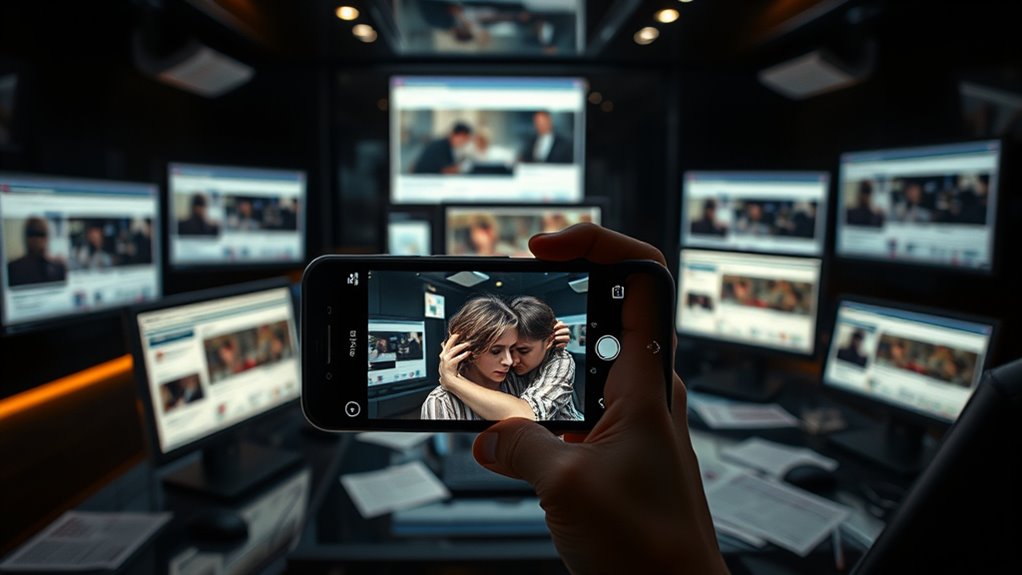Media plays a powerful role in shaping your views on cheating by creating narratives through TikTok, tabloids, and social media. These platforms often glamorize or trivialize infidelity, making it seem exciting, justified, or inevitable. Over time, repeated stories and images influence your perceptions of what cheating looks like and how acceptable it is. To understand how these scripts form and impact you, exploring further will reveal the subtle ways media influences your beliefs.
Key Takeaways
- Media portrays cheating as exciting or justified, influencing public perceptions and normalizing infidelity.
- TikTok videos often glamorize cheating, making it seem rebellious or less serious to viewers.
- Tabloid headlines sensationalize infidelity, shaping moral judgments and societal attitudes toward cheating.
- Both platforms actively reinforce narratives that frame cheating as either scandalous or an acceptable shortcut.
- Awareness of media influence enables critical evaluation of cheating stories, fostering healthier perspectives.

Have you ever wondered how media shapes the way people view cheating? It’s a powerful force that subtly influences your perceptions, beliefs, and even your behaviors. From TikTok videos to tabloid headlines, media outlets craft stories and images that create a narrative around cheating—what it looks like, how common it is, and whether it’s acceptable or condemnable. When you scroll through social media or flip through magazines, you’re not just consuming entertainment; you’re absorbing a set of scripts that can normalize or stigmatize infidelity. These stories often come packaged with specific portrayals: cheating as a daring act, a betrayal, or sometimes even a misunderstood mistake. Over time, they shape your understanding of what cheating entails and how you might respond to it.
TikTok, in particular, plays a significant role in shaping your views. Short videos often glamorize or trivialize infidelity, depicting it as exciting, rebellious, or even justified. Creators might share stories of how they cheated or got cheated on, framing these experiences as part of a romantic adventure. These snippets can make cheating seem less serious or more relatable, especially when they garner likes and comments. You might find yourself thinking, “Maybe cheating isn’t that bad,” influenced by these quick flashes of content. The platform’s viral nature amplifies these messages, making them seem more widespread and acceptable than they actually are. It’s easy to forget that what you see online is curated and often exaggerated, but it leaves an impression deep in your subconscious. Recognizing the media’s influence on perceptions of cheating can help you critically evaluate the stories you consume.
Tabloid headlines and sensational stories also play a pivotal role in shaping your cheating scripts. They often sensationalize infidelity, framing it as scandalous or inevitable. When you read about celebrities caught cheating, it reinforces the idea that cheating is part of high-profile lifestyles or that it’s a common human flaw. These stories tend to oversimplify complex emotional situations, making cheating appear as a quick fix or a moral failing that’s easy to judge. Over time, such media portrayals can influence your own moral compass, making you more likely to see cheating as either a shocking betrayal or a tempting shortcut, depending on how it’s framed.
Ultimately, media doesn’t just reflect society’s views on cheating—it actively shapes them. Every TikTok clip, tabloid story, or social media post adds to a collective narrative that influences your understanding and reactions. It’s essential to remain aware of these influences so you can critically evaluate what you consume. Recognizing how media scripts the way you think about cheating helps you develop your own grounded perspective, rather than blindly adopting the narratives that are thrown at you daily.
Frequently Asked Questions
How Do Media Portrayals of Cheating Differ Across Cultures?
Media portrayals of cheating vary widely across cultures. In some societies, cheating is depicted as a moral failure, emphasizing guilt and shame, while others glamorize it as a sign of independence or rebellion. You might notice Western media often focus on emotional consequences, whereas Eastern media may highlight social harmony and family honor. These differences shape your perceptions, influencing how you view cheating’s acceptability and consequences worldwide.
What Role Do Influencers Play in Normalizing Cheating Behaviors?
Influencers play a significant role in normalizing cheating behaviors by showcasing lifestyles that blur ethical boundaries. When you see influencers flaunting casual flings or dismissing fidelity, it subtly suggests that cheating is acceptable or even glamorous. This portrayal influences your perceptions, making cheating seem less harmful and more socially acceptable. As a result, you might feel less guilty or hesitant about engaging in dishonest behaviors, thinking it’s just part of modern culture.
Can Media Influence Lead to Increased Cheating in Specific Demographics?
Yes, media influence can lead to increased cheating in specific demographics. When you consume content that portrays infidelity as normal or glamorous, it can alter your perceptions and justify dishonest behaviors. Social media, TV shows, and tabloids often normalize or romanticize cheating, making it seem less harmful. This exposure can weaken your moral boundaries, especially if you’re part of a vulnerable group or experiencing relationship stress.
How Does Media Sensationalism Affect People’s Perceptions of Cheating Consequences?
Media sensationalism skews your perception of cheating consequences by amplifying rare cases and downplaying serious outcomes. You might start believing that cheating leads to quick fame or minimal fallout, making it seem less risky. This distorted view can reduce your fear of repercussions and normalize dishonesty. Ultimately, sensational stories make cheating seem less severe, encouraging you to contemplate it as a viable option without fully understanding the real consequences involved.
Are There Any Positive Media Messages About Fidelity and Honesty?
Yes, there are positive media messages about fidelity and honesty, but they often come with a twist. While movies and stories promote loyalty, they sometimes do so to highlight the drama of betrayal, making honesty seem more glamorous when it’s rare. Ironically, these messages can reinforce the idea that true fidelity is a noble ideal worth endeavoring for, even if media sometimes glamorizes infidelity to sell stories.
Conclusion
So, remember, the media is like a puppet master pulling your strings, shaping how you see cheating and relationships. It’s easy to believe what you see on screens, but don’t let it be the script for your own story. Keep your eyes open and your values grounded—otherwise, you might find yourself dancing to a tune that isn’t really yours. Your choices are your own, so don’t let media’s spotlight dim your true path.









